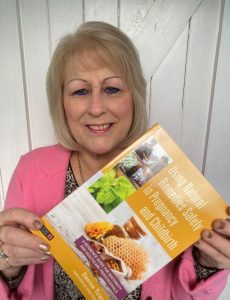Denise Tiran HonDUniv FRCM MSc is an internationally renowned authority on maternity complementary medicine, having pioneered the subject as a midwifery specialism since the early 1980s. She is Chief Executive Officer and Education Director for Expectancy, an independent education company providing complementary therapies courses for midwives, doulas and other maternity workers. Denise was awarded an Honorary Doctorate by the University of Greenwich in October 2020 and a Fellowship of the Royal College of Midwives in 2018 in recognition of her work in this field.
Here, she introduces her new book, Using Natural Remedies Safely in Pregnancy and Childbirth: A Reference Guide for Maternity and Healthcare Professionals.
I’ve been publishing on maternity complementary therapies for many years but the huge increase in popularity of natural remedies, including aromatherapy oils, herbs and homeopathic remedies led me to write this latest book. Expectant parents frequently ask midwives, doctors, doulas and antenatal teachers about the use of remedies such as raspberry leaf tea, and for remedies such as castor oil and evening primrose to start labour. The massive rise in popularity of aromatherapy in pregnancy and birth also means that parents often ask about essential oils, or want to bring them into the birth centre for use in labour. This can sometimes put the midwife or doctor in a difficult position because they may know very little about the oils and which are safe or not.

Denise Tiran
There is a huge amount of information – and mis-information – available online, but it presents a confusing minefield for both parents and professionals. The subject is not included in conventional medical or midwifery education, yet increasingly, maternity care providers need to know about the popular remedies and how to advise pregnant, labouring or newly birthed parents. Safety and accountability are the principles that underpin all that I teach in my Expectancy courses on complementary therapies for midwives but there is still the misconception that “natural” means “safe”. This just simply is not true. Anything that has the power to act therapeutically can also cause harm if used inappropriately. The issue is intensified when remedies such as herbal medicines are used alongside prescribed drugs.
This book aims to provide a ready reference for health professionals in both the maternity and obstetric fields as well as complementary therapy practitioners who may be working with pregnant clients. It aims to provide enough information to advise parents about the safety, or otherwise, of particular remedies, when working in the clinical situation.
